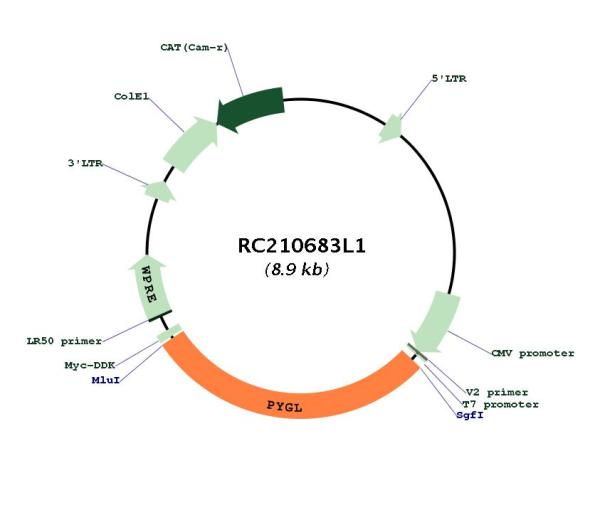PYGL (NM_002863) Human Tagged Lenti ORF Clone
CAT#: RC210683L1
- LentiORF®
Lenti ORF clone of Human phosphorylase, glycogen, liver (PYGL), transcript variant 1, Myc-DDK-tagged
"NM_002863" in other vectors (6)
Specifications
| Product Data | |
| Type | Human Tagged ORF Clone |
| Tag | Myc-DDK |
| Symbol | PYGL |
| Synonyms | GSD6 |
| Vector | pLenti-C-Myc-DDK |
| E. coli Selection | Chloramphenicol (34 ug/mL) |
| Mammalian Cell Selection | None |
| Sequence Data |
The ORF insert of this clone is exactly the same as(RC210683).
|
| Restriction Sites |
SgfI-MluI
Cloning Scheme for this gene
Plasmid Map

|
| ACCN | NM_002863 |
| ORF Size | 2541 bp |
| OTI Disclaimer | The molecular sequence of this clone aligns with the gene accession number as a point of reference only. However, individual transcript sequences of the same gene can differ through naturally occurring variations (e.g. polymorphisms), each with its own valid existence. This clone is substantially in agreement with the reference, but a complete review of all prevailing variants is recommended prior to use. More info |
| OTI Annotation | This clone was engineered to express the complete ORF with an expression tag. Expression varies depending on the nature of the gene. |
| Product Components | The ORF clone is ion-exchange column purified and shipped in a 2D barcoded Matrix tube containing 10ug of transfection-ready, dried plasmid DNA (reconstitute with 100 ul of water). |
| Reconstitution | 1. Centrifuge at 5,000xg for 5min. 2. Carefully open the tube and add 100ul of sterile water to dissolve the DNA. 3. Close the tube and incubate for 10 minutes at room temperature. 4. Briefly vortex the tube and then do a quick spin (less than 5000xg) to concentrate the liquid at the bottom. 5. Store the suspended plasmid at -20°C. The DNA is stable for at least one year from date of shipping when stored at -20°C. |
| Reference Data | |
| RefSeq | NM_002863.3 |
| RefSeq Size | 2859 bp |
| RefSeq ORF | 2544 bp |
| Locus ID | 5836 |
| UniProt ID | P06737 |
| Cytogenetics | 14q22.1 |
| Domains | phosphorylase |
| Protein Families | Druggable Genome |
| Protein Pathways | Insulin signaling pathway, Starch and sucrose metabolism |
| MW | 97.1 kDa |
| Gene Summary | This gene encodes a homodimeric protein that catalyses the cleavage of alpha-1,4-glucosidic bonds to release glucose-1-phosphate from liver glycogen stores. This protein switches from inactive phosphorylase B to active phosphorylase A by phosphorylation of serine residue 15. Activity of this enzyme is further regulated by multiple allosteric effectors and hormonal controls. Humans have three glycogen phosphorylase genes that encode distinct isozymes that are primarily expressed in liver, brain and muscle, respectively. The liver isozyme serves the glycemic demands of the body in general while the brain and muscle isozymes supply just those tissues. In glycogen storage disease type VI, also known as Hers disease, mutations in liver glycogen phosphorylase inhibit the conversion of glycogen to glucose and results in moderate hypoglycemia, mild ketosis, growth retardation and hepatomegaly. Alternative splicing results in multiple transcript variants encoding different isoforms.[provided by RefSeq, Feb 2011] |
Documents
| Product Manuals |
| FAQs |
| SDS |
Resources
Other Versions
| SKU | Description | Size | Price |
|---|---|---|---|
| RC210683 | PYGL (Myc-DDK-tagged)-Human phosphorylase, glycogen, liver (PYGL), transcript variant 1 |
USD 776.00 |
|
| RC210683L2 | Lenti ORF clone of Human phosphorylase, glycogen, liver (PYGL), transcript variant 1, mGFP tagged |
USD 1,076.00 |
|
| RC210683L3 | Lenti ORF clone of Human phosphorylase, glycogen, liver (PYGL), transcript variant 1, Myc-DDK-tagged |
USD 1,076.00 |
|
| RC210683L4 | Lenti ORF clone of Human phosphorylase, glycogen, liver (PYGL), transcript variant 1, mGFP tagged |
USD 1,076.00 |
|
| RG210683 | PYGL (tGFP-tagged) - Human phosphorylase, glycogen, liver (PYGL), transcript variant 1 |
USD 976.00 |
|
| SC118381 | PYGL (untagged)-Human phosphorylase, glycogen, liver (PYGL), transcript variant 1 |
USD 776.00 |
{0} Product Review(s)
Be the first one to submit a review






























































































































































































































































 Germany
Germany
 Japan
Japan
 United Kingdom
United Kingdom
 China
China



